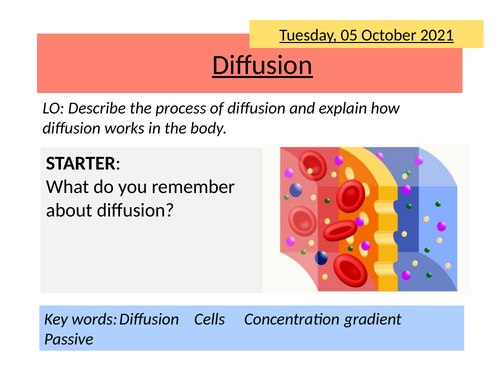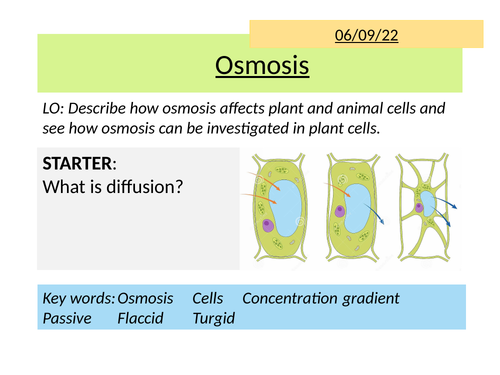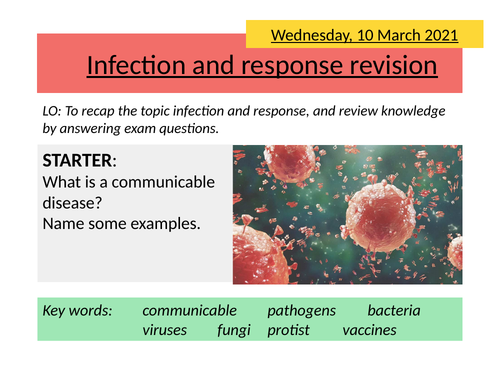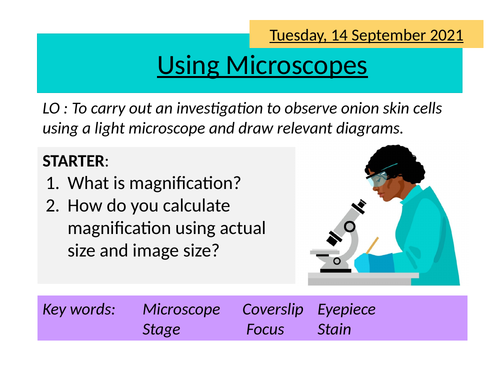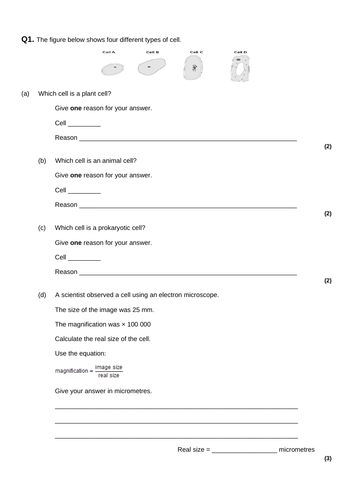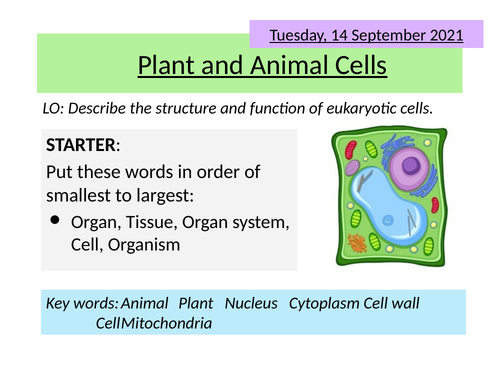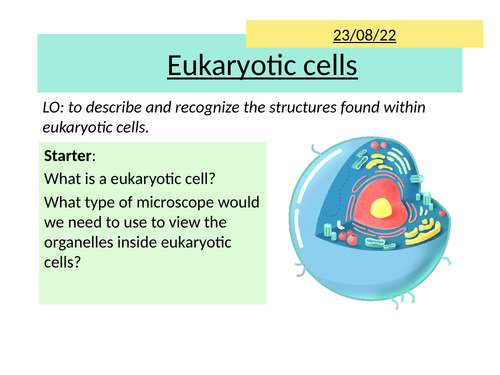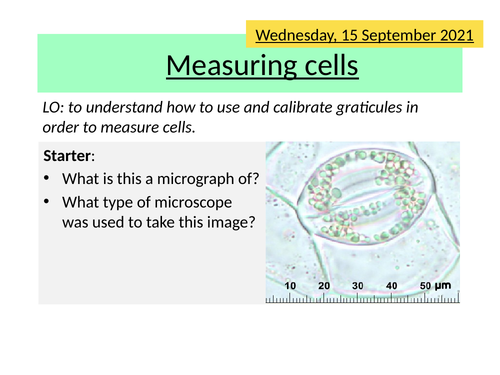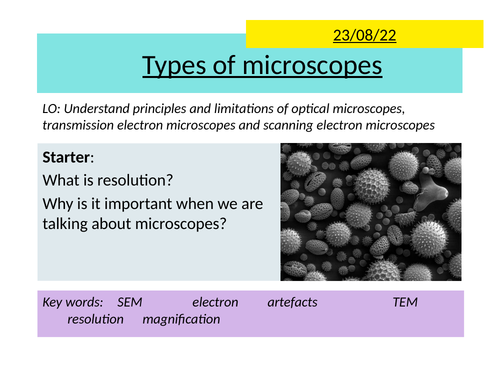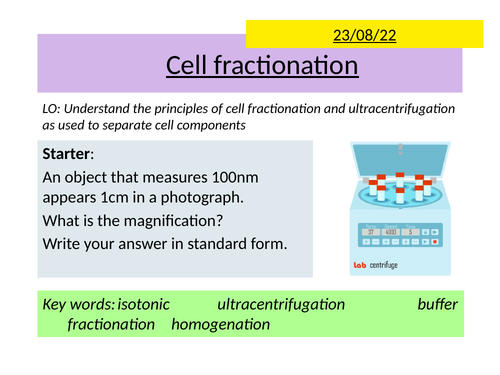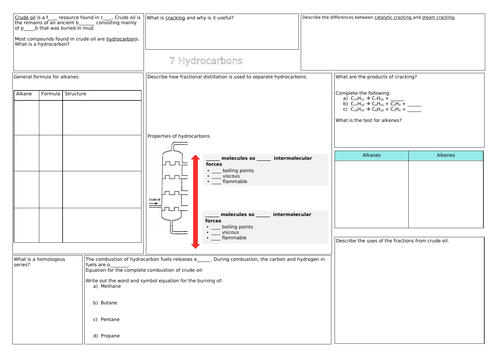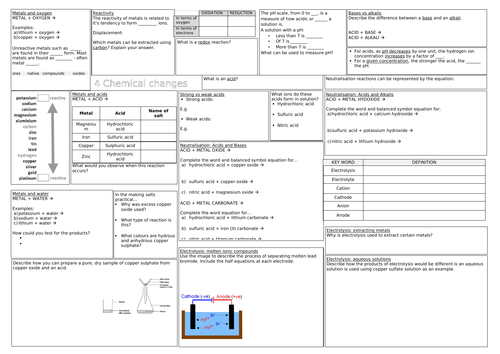34Uploads
6k+Views
6k+Downloads
All resources

AQA Diffusion & factors affecting rate
GCSE AQA Combined Science/Biology lesson on what diffusion is and why it is important in the lungs and small intestine. Additional lesson on the factors affecting rate of diffusion including optional pratical investigating how surface area to volume ratio affects the rate of diffusion.
Includes:
Two powerpoint lessons (including practical)
Exam questions and mark scheme

AQA Active Transport
GCSE AQA Combined Science/Biology lesson on Active Transport to understand what active transport is, its importance in the small intestine and plant roots, and how the process of active transport compares to diffusion and osmosis.
Includes:
Powerpoint lesson
Exam question and mark scheme

AQA Osmosis and required practical
AQA GCSE Biology/Combined Science lesson on Osmosis and how it affects plant and animal cells. Can be completed as a practical lesson or students can use the data provided to produce a graph and explain their results. Can be adapted to suit a range of abilities
Includes:
Powerpoint lesson
Required practical method
Example results table/data

AQA Infection and response revision
Revision lesson on the topic infection and response for AQA Combined Science. Covers all content and includes exam questions/mark schemes for recall.

AQA 2.1 Calculating Magnification
AQA A level Biology (new spec):
Introductory lesson on the topic of Cell Structure recaps how to calculate magnification, SI units and using standard form. Students are given opportunities to practise using worksheets and exam questions.
Includes:
GCSE recap questions
Powerpoint presentation
Calculation worksheets
Exam questions and mark scheme
Ready to use in classrooms.

AQA Microscopy practical
GCSE/KS3 practical lesson to observe onion skin cells and cheek cells at different magnifications using a light microscope and drawing biological diagrams.

AQA Microscopes and magnification
GCSE/KS3 lesson introducing microscopes including the different types of microscopes, the parts of a light microscopes and how to calculate magnification.
Includes:
Powerpoint
Exam questions and mark scheme

AQA Plant and Animal Cells
GCSE/KS3 lesson on Plant and Animal cells recapping the different structures of eukaryotic cells and their functions, and converting units in Biology. Students can apply their knowledge by completing various tasks and exam questions.
Includes:
Powerpoint
Exam questions and answers

AQA 2.8 Mitosis
AQA A level Biology (new spec):
Fifth lesson of the Cell Structure topic explores the stages of mitosis and how to identify them from micrographs. Students then apply their knowledge by answering exam questions.
Includes:
Powerpoint presentation
Exam questions and mark scheme
Ready to use in classrooms.

AQA 2.7 Viruses
AQA A level Biology (new spec):
Seventh lesson of the Cell Structure topic explores what viruses are the structure of a HIV virus.
Includes:
Powerpoint presentation
Ready to use in classrooms.

AQA 2.7 Prokaryotic Cells
AQA A level Biology (new spec):
Fifth lesson of the Cell Structure topic explores the structure of a prokaryotic cell and their functions. Students then apply their knowledge by completing worksheets.
Includes:
Powerpoint presentation
Worksheets
Ready to use in classrooms.

AQA 2.6 Cell Specialisation and Organisation
AQA A level Biology (new spec):
Sixth lesson of the Cell Structure topic recaps the different levels of organisation within an organism and what cell specialisation is.
Includes:
Powerpoint presentation
Ready to use in classrooms.

AQA 2.5 Eukaryotic Cells
AQA A level Biology (new spec):
Fifth lesson of the Cell Structure topic explores the structure of a eukaryotic cell, the organelles and their functions. Students then apply their knowledge by answering exam questions.
Includes:
Powerpoint presentation
Exam questions and mark scheme
Ready to use in classrooms.

AQA 2.4 Measuring Cells (Graticules)
AQA A level Biology (new spec):
Fourth of the Cell Structure topic looks at what a graticule is and how to use it (step-by-step). Can be combined with a microscopy practical and link to CPACs.
Includes:
Powerpoint presentation
Student powerpoint to annotate
Ready for use in the classroom.

AQA 2.3 Types of Microscopes
AQA A level Biology (new spec):
Third lesson of the Cell Structure topic explores the advantages and limitations of different microscopes (light, SEM and TEM) and describes how they work.
Includes:
Powerpoint presentation
Ready to use in classrooms.

AQA 2.2 Cell Fractionation
AQA A level Biology (new spec):
Second lesson of the Cell Structure topic explores the process and purpose of cell fractionation. Students then apply their knowledge by answering exam questions.
Includes:
Powerpoint presentation
Exam questions and mark scheme
Ready to use in classrooms.

AQA 2.1 Calculating Magnification
AQA A level Biology (new spec):
Introductory lesson on the topic of Cell Structure recaps how to calculate magnification, SI units and using standard form. Students are given opportunities to practise using worksheets and exam questions.
Includes:
GCSE recap questions
Powerpoint presentation
Calculation worksheets
Exam questions and mark scheme
Ready to use in classrooms.

AQA Hydrocarbons revision mat
Revision mat/knowledge organiser for GCSE (9-1) AQA Combined Science topic Hydrocarbons which covers all specification points.

AQA Chemical changes revision mat
Revision mat/knowledge organiser for GCSE (9-1) AQA Combined Science topic Chemical Changes which covers all specification points.

AQA Bonding revision mat
Revision mat/knowledge organiser for GCSE (9-1) AQA Combined Science topic Bonding which covers all specification points.

